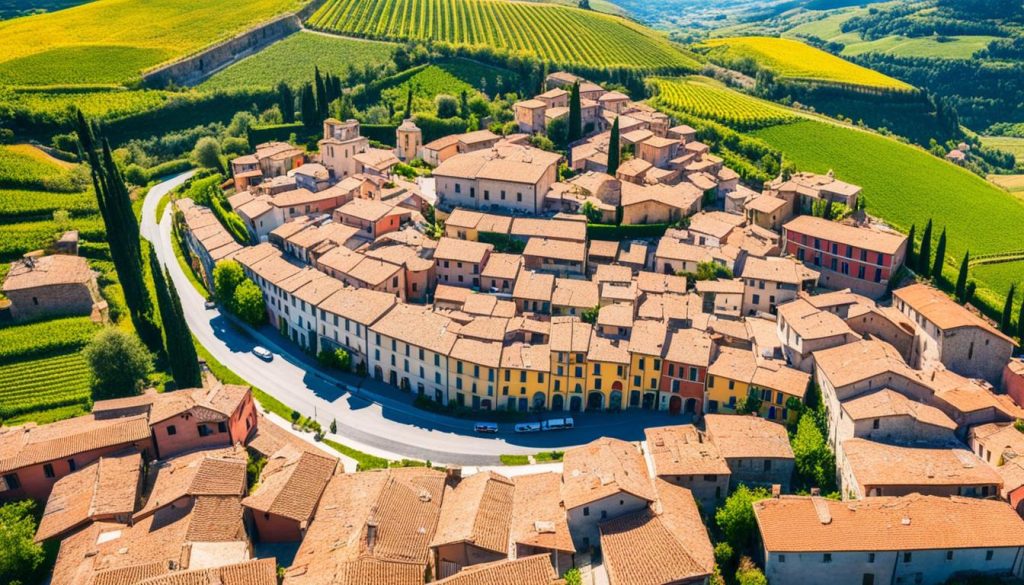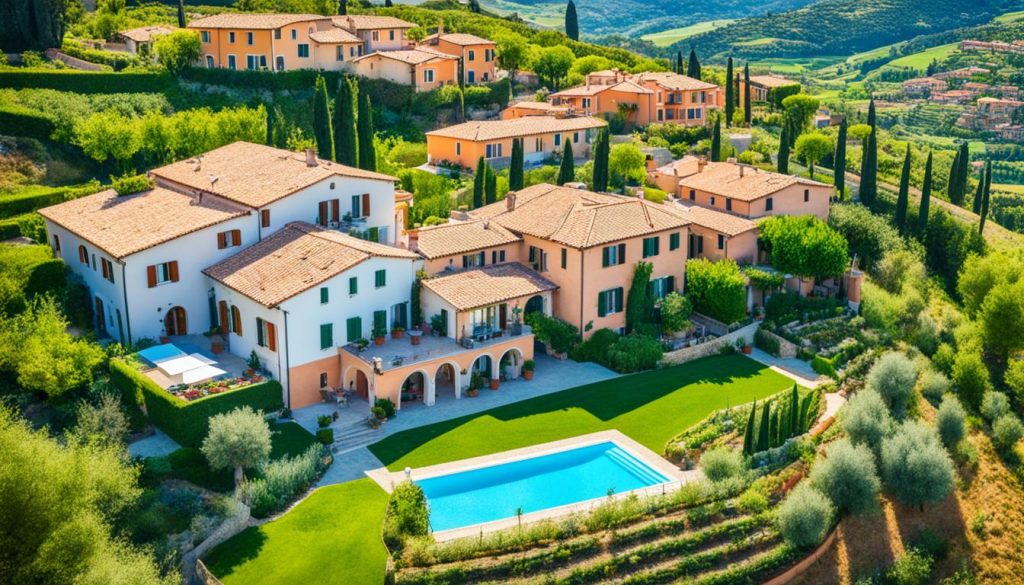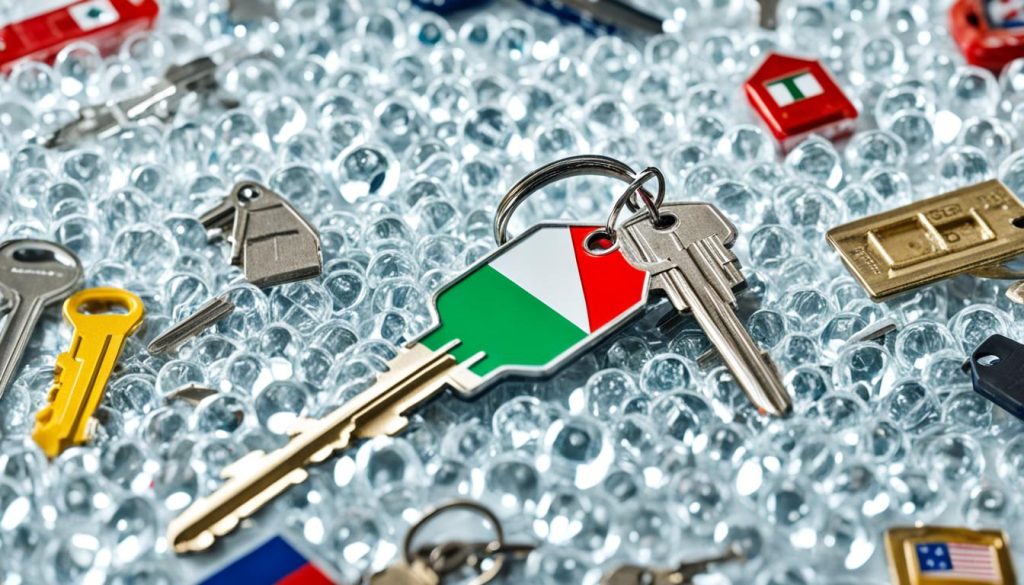Buying property in Italy is becoming more popular among UK expats. This guide aims to make the Italian property market clearer. It covers the challenges and opportunities of living in Italy. You’ll learn about the rich culture, vibrant lifestyle, and the wide range of properties available.
It’s important to understand the real estate market for UK expats. The market is always changing, with new trends and rules. Being informed can help you make a good investment and settle into Italian life smoothly.
Key Takeaways
- The Italian property market offers diverse opportunities for UK expats.
- Cultural and lifestyle factors play a significant role in choosing a property.
- Understanding local regulations is crucial when buying a home in Italy.
- Staying informed about current real estate trends can enhance your investment strategy.
- Many factors, including location and property type, should influence your decision.
Understanding the Italian Property Market
The Italian property market has seen ups and downs in recent years. This is due to economic factors and changes in what people want. After the COVID-19 pandemic, the market slowly started to recover. Websites like Immobiliare.it and the Italian National Institute of Statistics show this recovery.
Property prices in Italy change a lot depending on where you are. Big cities like Milan and Rome are usually more expensive than the countryside. But places like Puglia and Tuscany are getting more popular with expats, which has made property prices go up.
Here are some key statistics on average property prices in different regions:
| Region | Average Property Price (€) | Price Change (%) 2022-2023 |
|---|---|---|
| Milan | 3,400 | +5 |
| Rome | 2,700 | +3 |
| Tuscany | 2,200 | +4 |
| Puglia | 1,500 | +6 |
It’s important for potential buyers, especially UK expats, to understand these market trends. Knowing what’s happening in the Italian real estate market can help you make smart choices.
Why Choose Italy for Your New Home?
Italy is a mix of rich history, stunning landscapes, and famous food. It’s a top choice for those thinking of moving abroad. You can live in places like the beautiful Amalfi Coast or the peaceful Tuscan countryside. Italy has something for everyone.
Italy is known for its friendly people, making it easy for expats to settle in. Living in Italy means diving into local life and traditions. You’ll make strong bonds with the locals and find new adventures every day.
The food in Italy is amazing, with fresh ingredients and true flavours. For many, the food is a big part of the Italian way of life. You can explore local markets and try regional dishes that are unique to each area.
More and more people are moving to Italy for its great lifestyle, quality of life, and culture. These facts show why Italy is a great choice for a new life.
Types of Property Available in Italy

Italy has a wide range of properties for different lifestyles and tastes. If you’re thinking of moving there, it’s key to know what’s available. You can find beautiful villas, charming countryside homes, and modern apartments. Each one shows off Italy’s varied architectural styles.
Villas are a big draw for those moving abroad. They often have beautiful designs and big gardens. You’ll find them mostly in places like Tuscany and the Amalfi Coast. Prices change a lot depending on where they are and what they offer. Villas are great for families or those who love to host guests, thanks to their large indoor and outdoor spaces.
Apartment living is also popular. Cities like Rome and Milan offer a lively atmosphere. You can find apartments in old buildings or new complexes. They’re close to public transport and shops, making life easy.
If you want a touch of the countryside, consider a countryside home. These homes are in beautiful villages or hills. They’re often old farmhouses or buildings that have been updated. You can find them in places like Umbria and the Veneto, and they’re usually cheaper than city homes.
Here’s a quick look at the different properties you can find:
| Property Type | Key Features | Typical Locations | Average Price Range |
|---|---|---|---|
| Villas | Spacious, elegant designs, gardens | Tuscany, Amalfi Coast | €500,000 – €3,000,000 |
| Apartments | Variety of styles, urban conveniences | Rome, Milan | €200,000 – €1,200,000 |
| Countryside Homes | Rustic charm, traditional architecture | Umbria, Veneto | €150,000 – €800,000 |
Each type of property has its own benefits, meeting the needs of different buyers in Italy. Knowing the differences will help expats make the best choice for their new home.
Property in Italy: Key Considerations for UK Expats
Buying property in Italy has many factors UK expats need to think about for a smooth process. It’s important to know the legal rules for foreign buyers and understand property taxes in Italy. This knowledge helps make buying property in Italy easier.
Legal Requirements for Foreign Buyers
Foreign buyers must meet certain legal requirements when buying property in Italy. You’ll need a valid ID, an Italian fiscal code, and proof of money, like bank statements. It’s key to work with a notaio, as they handle the property transfer and make sure everything is legal.
This is especially important for UK expats who might not know the process well.
Tax Implications of Buying Property
Knowing about property taxes in Italy is crucial for your finances. You’ll need to think about IMU (Municipal Property Tax) and TARI (waste tax). IMU is for second homes and varies by area, while TARI depends on the property’s size and waste.
It’s important to consider these costs before buying to avoid surprises later.
| Tax Type | Description | Approximate Rate |
|---|---|---|
| IMU | Municipal property tax applicable on second homes. | 0.4% – 1.06% of property value |
| TARI | Waste tax calculated based on property size and waste output. | Varies by municipality; average around €200 – €300 annually |
Finding the Right Location in Italy
Choosing the right place in Italy is key for UK expats looking for their dream home. The country has vibrant cities, rich history, and unique culture. Climate, local amenities, and community spirit are important when picking a location. Italy offers everything from busy cities to peaceful countryside, making it vital to find the best spots for expats.
Popular Regions for UK Expats
Some regions in Italy are favourite spots for expats. Tuscany is known for its stunning views and historic towns. It’s perfect for those wanting a mix of countryside and culture. Cities like Florence and Siena offer art, architecture, and great food.
- Umbria: Known as the “green heart” of Italy, it’s full of hills and medieval towns. It’s ideal for those who love peace.
- Coastal Regions: Places like Liguria and the Amalfi Coast have beautiful views and a lively seaside culture. They’re great for those who love the sun and being outdoors.
- Major Cities: Milan and Rome have lots of amenities, jobs, and cultural diversity. They’re perfect for expats who like city life.
Choosing Between Urban and Rural Properties
Expats must think about lifestyle and investment when choosing between city and countryside homes. Cities offer a fast-paced life, lots of amenities, and social activities. On the other hand, rural areas are quieter and have a strong community feel. They’re great for those who love peace and nature. It’s important to consider what you prefer.
| Property Type | Benefits | Considerations |
|---|---|---|
| Urban Properties | Access to amenities, vibrant social life | Higher costs, noise and congestion |
| Rural Properties | Peaceful environment, beautiful landscapes | Fewer services, potential isolation |
Financing Your Purchase in Italy

Getting a mortgage is a key step when you buy property in Italy. It’s especially important for UK expats to understand the mortgage process. Banks and lenders offer mortgages for expats, making buying a home easier.
Understanding the Mortgage Process
The mortgage process in Italy is different from the UK’s. Non-residents often need a bigger deposit, about 30% of the property’s price. Interest rates can change and depend on your finances and the lender you choose. Banks like UniCredit and Intesa Sanpaolo have special services for expats.
Exchange Rate Considerations
Watching the currency exchange rate is vital when buying property in Italy. Changes in rates can affect your budget. Websites like XE.com offer up-to-date information, helping with financial planning. Knowing about exchange rates can help avoid unexpected costs during the purchase.
| Bank | Typical Deposit (%) | Interest Rate Range (%) | Suitable for Expats? |
|---|---|---|---|
| UniCredit | 30 | 2.5 – 4.5 | Yes |
| Intesa Sanpaolo | 30 | 2.8 – 4.2 | Yes |
| BNL | 40 | 3.0 – 5.0 | Yes |
Working with Estate Agents in Italy
Working with estate agents in Italy can be very helpful when buying a property. They know the local market well, making the process smoother. For expatriates, it’s key to find an agent who gets their unique needs and challenges.
When picking an estate agency, consider their knowledge and success stories. Reading reviews from past clients can give you a good idea of the agent’s quality. It’s important to value honesty, clear communication, and trustworthiness in an agent.
Good communication is crucial, especially when there are language barriers. Expatriates should make their wishes clear to avoid any confusion. Keeping in touch with the agent regularly can build a strong working relationship. Working with an agent who knows the expat market means getting help to find a property that fits your dreams.
Using estate agents in Italy makes buying a property easier and more likely to be successful. With the right support, UK expats can feel confident as they look to buy a home in Italy.
The Buying Process: Step-by-Step
For UK expats dreaming of a home in Italy, understanding the property buying process is key. It starts with making an offer and then signing a preliminary agreement. By knowing these steps, buyers can move through the process with confidence.
Making an Offer on a Property
First, you need to make an offer on a property you like. It’s wise to look at similar properties to make sure your offer is fair. Then, share your offer with your estate agent. Be ready for negotiations, where you might need to adjust your offer.
Signing the Preliminary Agreement
Next, you’ll sign the preliminary agreement, or compromesso. This contract sets out the sale’s terms, like the price and any conditions. You’ll usually pay a deposit to secure the property while you finalize things. It’s important to understand this agreement well, as it might have special clauses for your purchase.
| Step | Description |
|---|---|
| 1. Property Search | Start looking for properties that fit your needs, budget, and location. |
| 2. Making an Offer | Give your offer to the estate agent, keeping in mind the market. |
| 3. Negotiations | Be open to talks; you might need to adjust your offer. |
| 4. Signing the Preliminary Agreement | Read and sign the compromesso, paying the deposit. |
| 5. Final Purchase Agreement | Finish the legal paperwork and pay the rest of the price. |
Understanding Property Valuation and Surveys
Property valuation in Italy is key when buying a home. There are several ways to figure out a property’s value. One common method is the comparative market analysis. It looks at similar properties in the same area to set a fair price.
Professional appraisals are another way to value a property. Experts check the property’s condition, location, and market trends for an accurate value. These appraisals help buyers make smart choices and ensure their investment matches the market.
Before buying, it’s vital to get home surveys done. These surveys check for hidden problems. They let buyers talk about repairs or think again about buying.
- Building surveys – Offers a detailed look at the property’s structure and state.
- Homebuyer reports – Summarises key issues but doesn’t go into as much detail as a full building survey.
- Condition reports – Gives a basic overview, focusing on the property’s condition.
To find certified surveyors, buyers can ask local real estate agents or look online. Survey costs depend on the property’s size and type. They usually range from a few hundred to several thousand euros.
Knowing about the different surveys and property valuation in Italy helps buyers make a wise choice for their new home.
Legal Aspects of Property Ownership in Italy
For anyone looking to invest in Italian real estate, it’s crucial to understand the legal side of owning property. Knowing about Italian property law helps avoid potential problems. Title deeds are key in proving ownership and protecting your property. Foreign buyers need to be aware of the unique challenges they might face.
Understanding Title Deeds
The title deed, or “atto di vendita,” is the main document for owning property in Italy. It lists the buyer and seller, the property details, and any issues that might affect it. It’s important to know about title deeds to ensure you have clear ownership and understand any problems that might exist.
Foreign buyers might find that owning property in Italy is different from what locals experience. While foreigners can buy property, there are some limits, especially in areas with historical or cultural value. Knowing these differences helps buyers deal with the complexities of title deeds.
Encumbrances are something to pay attention to as well. These include mortgages, easements, or legal claims on the property. It’s important to know about these as they can affect your ownership rights. Always check public records thoroughly to uncover any potential issues before buying.
The following table provides insights into the various components associated with title deeds:
| Component | Description |
|---|---|
| Property Description | Details about the location, boundaries, and characteristics of the property. |
| Buyer and Seller Information | Names, addresses, and identification details of both parties involved in the transaction. |
| Obligations | Details related to any prior mortgage or obligations associated with the property. |
| Restrictions | Relevant laws or restrictions affecting property use, such as zoning laws or heritage designations. |
| Transfer of Ownership | Legal process capturing the transition of ownership from seller to buyer. |
Renovation and Restoration Considerations
Renovating property in Italy is an exciting project. Whether you’re restoring a historical villa or modernising a rustic farmhouse, knowing the steps is key. It’s important to understand the permits and local rules for a smooth process. This means knowing what planning permission you need and how to follow building regulations.
Permits and Regulations
Starting a renovation in Italy means getting the right permits. The rules change based on where you are, the property type, and how much you’re changing it. There’s a line between minor and major works. Minor changes might not need much planning permission, but big changes require a detailed application.
Here are some important points about permits and building rules:
| Type of Work | Planning Permission Required | Typical Duration for Approval |
|---|---|---|
| Minor Repairs (e.g., painting, internal changes) | No | Not applicable |
| Major Renovations (e.g., structural changes) | Yes | 3-6 months |
| New Construction | Yes | 6-12 months |
There are often challenges, like dealing with bureaucracy and cultural differences in building. Working with local experts who know about planning and building rules can help. It’s vital to understand the legal side for a successful renovation. This way, UK expats can make their dream of owning property in Italy come true.
Insuring Your Italian Property

When looking at property insurance in Italy, it’s key to check out the options for homeowners. You need to know the types of coverage that can protect against various risks. This includes natural disasters, which are common in some areas.
There are two main types of insurance for property owners: building insurance and contents insurance. Building insurance covers the structure of your home. Contents insurance protects your personal items inside. Expat property insurance can also be tailored to meet the needs of those moving from abroad, making the move to Italy smoother.
Many insurance companies offer policies for expats, with options that match local laws and property types. It’s a good idea to look at different companies and their policies. Here’s a comparison of key factors that affect insurance costs in Italy:
| Insurance Company | Building Insurance Coverage | Contents Insurance Coverage | Natural Disaster Protection |
|---|---|---|---|
| Allianz | Up to €500,000 | Up to €100,000 | Yes |
| Axa | Up to €750,000 | Up to €150,000 | Yes |
| Generali | Up to €1,000,000 | Up to €200,000 | Yes |
| UnipolSai | Up to €600,000 | Up to €120,000 | No |
The location of your property also affects insurance costs. Areas at risk of flooding or earthquakes usually have higher premiums. Knowing these regional differences is important for budgeting for insurance.
Getting the right expat property insurance gives you peace of mind. It lets you enjoy your Italian home without worry. It’s important to look at different policies based on your situation, the risks in your area, and what coverage you need.
Settling into Life in Italy
Expats moving to Italy need to understand cultural integration for a smooth move. Living here is exciting but also requires adjusting. Getting to know the language, customs, and traditions helps with making friends and settling in.
Cultural Adjustments
Embracing Italian life means really trying to fit in culturally. Here are some key points:
- Language: Learning Italian makes life better. Think about joining language classes or talking groups to get better.
- Customs and Etiquette: Knowing how to greet with a kiss or share a meal builds trust. Look into local traditions and join in on festivals to really get into it.
- Networking: Make friends with locals and other expats. Join clubs or groups based on your interests to meet new people.
- Bureaucratic Navigation: Dealing with Italian paperwork can be tough. Get to know what you need for residency and legal stuff.
- Social Norms: Pay attention to how people act, like when they eat or dress. This helps you fit in and feel more at ease.
Adjusting to Italy means both cultural and practical steps. Tackling these areas helps you settle in and improve your life here. It also makes your interactions with people better.
| Aspect | Importance | Suggested Actions |
|---|---|---|
| Language | High | Enroll in classes, practice regularly |
| Customs | Medium | Participate in local events |
| Networking | High | Join clubs, attend social gatherings |
| Bureaucracy | High | Research and organise paperwork |
| Social Norms | Medium | Observe locals, adapt behaviours |
Maintaining Your Property from Abroad
For UK expats, managing a home in Italy from afar can be tough. It’s hard to keep an eye on things and fix problems quickly. But, getting help from property management services can make things easier and give you peace of mind.
Hiring Property Management Services
Choosing property management for expats means your home stays in top shape even when you’re not there. Here are some big pluses:
- Routine Maintenance: These services do regular checks, keep the garden tidy, and handle upkeep. This makes sure your home is welcoming and safe.
- Emergency Repairs: If something breaks down suddenly, they can fix it fast to stop more damage.
- Security Monitoring: They offer surveillance and check-ins to keep your property safe, keeping off unwanted visitors.
- Rental Management: If you rent out your property, they can help with tenant issues and make renting easier.
- Local Expertise: They know all about local rules and how to keep your property in good shape, making smart choices.
When picking a property management service, think about these things:
- Find well-known companies with good reviews and lots of experience in Italy.
- Look at what they offer and their prices to make sure they meet your needs.
- See if they have any special qualifications or memberships that show they’re professional.
Choosing the right property management service can really help you manage your Italian home from afar. It lets you enjoy your property without the worry of constant upkeep.
Community and Lifestyle in Italy
Starting a new life in Italy brings a mix of culture, warmth, and social life. Expats find their new home full of lively piazzas, festivals, and markets. These places show the heart of the Italian way of life. Every community, big or small, offers chances to join in and make friends.
Getting involved in local events, clubs, and groups is a great way to meet people. You could join a cooking class, take part in a festival, or play sports with locals and other expats. These activities make life in Italy richer and help you make friends.
Online forums and expat groups also play a big part in building a community. They let people share stories and advice. This online world helps everyone, new and old, find their place in Italy. By taking part in these activities, expats really get to know their new home and live a full life in a welcoming country.
FAQ
What are the main legal requirements for UK expats buying property in Italy?
UK expats need a codice fiscale (tax code) for all dealings, including buying property. They must work with a notaio (notary) for legal help. This ensures all papers are correct.
How can I finance my property purchase in Italy?
Options for funding include getting a mortgage from Italian banks, needing a 20-30% deposit. Expat buyers should watch out for exchange rate changes affecting their purchase.
What types of properties are available in Italy?
Italy has many properties like villas, apartments, and homes in the countryside. Each area has its own style and prices, fitting different tastes and budgets.
Are there specific property taxes I need to be aware of?
Yes, buyers must consider IMU (Municipal Property Tax) and TARI (waste tax). These are key costs when buying and owning property in Italy.
What is the buying process like for foreigners in Italy?
The process includes making an offer, signing a preliminary agreement (compromesso), and finalising with a notaio. Knowing each step is key for a smooth buy.
What are the best regions in Italy for expats to consider?
Top spots for expats are Tuscany, Umbria, and coastal areas like Amalfi. Cities like Florence, Rome, and Milan offer lively scenes but are pricier.
How important is property insurance in Italy?
Property insurance is vital to protect your investment. Choose coverage that covers natural disasters, building, and contents insurance.
How do I handle property management if I live abroad?
Using property management services is a good idea for expats away from Italy. They handle upkeep, rentals, and security for you.
What cultural adjustments should I expect when moving to Italy?
Be ready for cultural differences, like social norms and language. Joining local groups and activities can help you settle in and connect with the culture.
Are surveys necessary before purchasing property in Italy?
Yes, surveys are key to spot any problems before buying. They include checks on the structure, ensuring the property is as expected.









